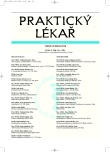-
Medical journals
- Career
Symptomatic diabetic neuropathy: irreversible nerve damage?
Authors: P. Bouček
Authors‘ workplace: Ředitel: MUDr. Štefan Vítko, CSc. ; Institut klinické a experimentální medicíny, Praha ; Přednosta: Doc. MUDr. František SAUDEK, DrSc. ; Klinika diabetologie ; Přednosta: prof. MUDr. Terezie Pelikánová, DrSc. ; Centrum diabetologie
Published in: Prakt. Lék. 2007; 87(2): 82-85
Category: Various Specialization
Overview
Diabetic peripheral neuropathy is the most common late complication of diabetes mellitus which frequently results in clinically significant morbidities e.g. pain, sensory deficits, foot ulcers and amputations. During its natural course it progresses from initial functional to late poorly reversible structural changes. Various interconnected pathogenetic concepts of diabetic neuropathy based on metabolic and vascular factors mostly derived from long-term hyperglycemia have been proposed. These pathogenetic mechanisms have been targeted in several experimental and clinical trials which, for example. tested restoration of normoglycemia by pancreas or islet transplantation, polyol pathway blockade by aldose reductase inhibitors, mitigation of oxidative stress and correction of abnormalities in essential fatty acid metabolism or of growth factor deficits. Unfortunately, so far no treatment based on pathogenic considerations has been introduced into clinical practice and thus optimal glycemic control aimed at preventing the occurrence of irreversible structural nerve changes should be instituted immediately at the time of diagnosis of diabetes.
Key words:
diabetic neuropathy; pathogenesis; experimental and clinical studies of therapy.
Labels
General practitioner for children and adolescents General practitioner for adults
Article was published inGeneral Practitioner

2007 Issue 2-
All articles in this issue
- The legacy of I. F. Semmelweis; key milestones in the development of hospital hygiene and current challenges.
- Insulin pump therapy for diabetic patients
- Three hundreds pancreas transplantations in the Institute of Clinical and Experimental Medicine in Prague
- Symptomatic diabetic neuropathy: irreversible nerve damage?
- Catheter ablation for atrial fibrillation in 2007
- Diabetic foot syndrome
- Risk of malnutrition and nutritional support in Alzheimer disease
- How well do patients follow their doctor’s advice?
- A manual for the „Our class does not smoke“ programme
- Two cases of aortic valve endocarditis after the floods in 2002
- Symptoms of paraneoplastic encephalopathy as the first clinical sign of Hodgkin’s lymphoma. A case study
- Active search for prostate cancer by PSA testing in GP surgery
- General Practitioner
- Journal archive
- Current issue
- Online only
- About the journal
Most read in this issue- Risk of malnutrition and nutritional support in Alzheimer disease
- Active search for prostate cancer by PSA testing in GP surgery
- The legacy of I. F. Semmelweis; key milestones in the development of hospital hygiene and current challenges.
- Symptomatic diabetic neuropathy: irreversible nerve damage?
Login#ADS_BOTTOM_SCRIPTS#Forgotten passwordEnter the email address that you registered with. We will send you instructions on how to set a new password.
- Career

